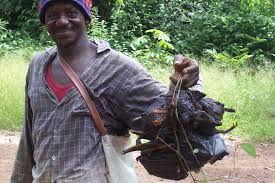Published by: Glory Ugonma Itiafe

Bushmeat, a meat sourced from animals in the wild, is a highly preferred meat option in many parts of Nigeria. These wild animals range from pangolins to lions, elephants, monkeys, chimps, red river hogs, snakes, grass cutters, bushpigs, etc. The cooking method varies from oven-roasting to frying or boiling in soup.
Culturally, bushmeat is a symbol of honour rooted in African tradition. In some parts of urban Central and West Africa, it is also seen as elevating class status if bushmeat, prized as a costly delicacy, is on the menu. It is often served at high-end gatherings to showcase wealth and cultural ties at any occasion or ceremony.
The high cost of bushmeat makes it a status symbol, with species like pangolin and antelope prized at elite gatherings. Similarly, wealthier urban Nigerians consume bushmeat as a luxury, suggesting its role in high-society gatherings.
This is hinged on a general acceptance of bushmeat (wildlife) as a natural, uncontaminated, and healthy source of meat compared to farm animals. This was evidenced in a 2021 survey conducted by WildAid, an environmental non-profit, involving over 2000 people in Lagos, Calabar, Abuja, and Port Harcourt.
This survey revealed that 71% of respondents had previously consumed bushmeat, with 45% having done so within the past year. 88% believed that all bushmeat should be made available and legal to buy, and 75% stated intent to still eat bushmeat in the future.
Recent social media posts, especially on X and TikTok, reflect the widespread consumption and preference for bushmeat as highlighted by this survey, with many considering it safe.
On March 22, 2023, popular X influencer, Oku (@Oku_Yungz), posted an image (archived here) showing a wild animal, which looks like a Civet, just freshly poached. The comments on the post reflect the popularity of bushmeat consumption in Nigeria.
In the comment section, Adu (@adufemiee) (archived here) stated that it is a lovely meat.
Another X user, Egbe Eji Egbu Agu ( Egbeonyedika) (archived here) agreed with Adu, saying, “e sweet pass anything.”
Other comments on there reflected the danger of consuming bushmeat, making reference to the probability of it transmitting zoonotic diseases to the populace. One such was from X user Celebrity Tailor (@Mrklassiq_) (archived here), who said, “Make dem no bring Covid part 2 come again.”
Another user, E. (@E_phraimNorji) (Archived here), reflected on animal cruelty, the imminent extinction of endangered wildlife species, and the risk of zoonotic disease transmission.
“You people, tufiakwa. This isn’t bush meat, that’s a civet, and they’re an endangered species. You don’t have to eat everything. This is how you catch stupid diseases,” he wrote.
An X user, Vuvu Videos (@videosvuvu), posted a video (archived here) from a Nigerian TikTok vendor account, @localfoodsdairy, on April 14, 2024, advertising freshly killed bush meat online.
In 2025, the TikTok user localfoodsdairy posted more content promoting the sale of bushmeat here, here, and here.
On May 4, 2025, another X user, Machi.avelli (@goldentunsh), commented about the perfect pairing of bushmeat in Ijebu egusi soup (Archived here).
On May 6, 2025, X user Kakpoo Sound (@stoner_nwaigbo) posted (archived here) about eating bushmeat with palm wine.
On May 8, 2025, Yuzedo (@uLXXVII) shared a post (archived here) expressing how delicious a capybara, a wild animal native to South America, might be in reaction to a post by a non-Nigerian science-focused educational account, Science Girl (@gunsrosesgirl3) (archived here).
In the past, we have seen bushmeat seized from Nigerian travellers because of the danger of travelling with such, but this has not stopped Nigerians’ love for bushmeat.
On March 16, 2024, TikTok user @RoyalOmoYoruba posted a video (archived here) that showed a Nigerian woman travelling to the US undergoing an immigration bag search and having her packaged dried bushmeat seized and disposed of in the trash by the immigration officer, who cited the likelihood of it bringing in zoonotic diseases into the US.
More social media posts suggest the popularity of bushmeat consumption in Nigeria amongst different demographics. (Archived here, here, here, here, and here.)
Given the persistent myth that bushmeat is healthy, natural, and uncontaminated, coupled with significant health risks, particularly from zoonotic diseases like COVID-19, monkeypox, and tuberculosis, which have reportedly been linked to wildlife, DUBAWA had to fact-check the claim.
Verification
Bushmeat consumers always give two reasons for consuming it: one is that it offers a unique taste compared to domestically farmed livestock, and the other is its perceived purity. As evidenced in the Wild Aid report, many believe that bushmeat is uncontaminated meat that is still in its natural state, free from diseases, and free from industrial farming and drug administration.
A 2022 report on the bushmeat crisis in Nigeria notes that consumers value bushmeat’s distinct flavour and organic qualities despite its health risks.
Mark Ofua, a wildlife expert, conservation educator, veterinarian, and West Africa director for WildAfrica fund, refuted the claim that bushmeat is a healthy and uncontaminated meat option. He noted three key factors: the heavy presence of metals in the offal of wild animals, antimicrobial resistance (AMR), and zoonotic diseases that make bushmeat unsafe.
Professor Olajumoke Morenikeji, a renowned parasitologist, Deputy Vice-Chancellor of KolaDaisi University, Ibadan, Oyo State, Conservationist, and founder of the Pangolin Conservation Guild of Nigeria (PGCN), also agreed with Dr. Ofua. She said bushmeat is not consistently hygienic.
Professor Morenikeji said the safety of bushmeat depends on how it is sourced, handled, and prepared. In many parts of the country, bushmeat is typically hunted in forests or rural areas. It is often sold in open-air markets, where refrigeration, veterinary inspection, and sanitary practices are either unavailable or limited. She says the lack of regulation and oversight raises very serious concerns about hygiene and food safety.
Heavy presence of metals
When factories dump their toxic waste into the gutters and waterways, this contaminated water, already containing heavy metals, is consumed by wildlife. Dr. Ofua’s research revealed a significant presence of metals such as cadmium, lead, arsenic, and mercury. Wildlife animals drink this contaminated water and retain these metals in their bodies.
Nigeria is the world’s second-largest producer of plastic waste, churning out 3.5 million tonnes of waste annually, second only to India. The plastic waste seeps into the country’s water bodies, further polluting the water channels and impacting wildlife.
Antimicrobial-resistant organisms
Dr Ofua further explained that in his recent PhD study, conducting experiments after visiting wet markets and testing the offal of these bushmeat, he found sufficient evidence that most of our wildlife carry antimicrobial-resistant organisms, which is a shocking discovery since they are not exposed to antibiotics, nor do they get treated in the wild.
When asked how these wildlife contract this, he said through the dumping of effluents into our water bodies, effluents from industrial plants, sewage systems, and agricultural operations. These liquid wastes release antibiotics and antibiotic-resistant organisms into the environment, including plants, soil, and water bodies.
The danger herein is that the handlers of such infected AMR bushmeat do not necessarily need to eat it; merely touching it passes the bacteria along, including sellers, butchers, and buyers.
Antimicrobial resistance is a condition that results from the abuse of antibiotics. He says that this is a growing phenomenon that has killed more people globally than HIV/AIDs. The World Health Organisation (WHO) estimates it could cause 10 million deaths annually by 2050 if unchecked.
Zoonotic diseases
Another risk associated with Bushmeat is the transfer of zoonotic diseases, which are transmitted from animals to humans and vice versa. Studies have shown that approximately 70 per cent of emerging infectious diseases in the world are zoonotic. Diseases like COVID-19, which grounded the world, emanated from wet markets (bushmeat markets) in Wuhan, China.
Ebola, Monkeypox, and SARS-CoV-2 are also zoonotic diseases. So when you eat bushmeat, you are at risk of contracting these diseases.
Professor Morenikeji further supports Mr Mark Ofua’s stance on the zoonotic disease risks associated with bushmeat. She said diseases like Lassa Fever, Monkeypox, and Ebola have been linked to the handling or consumption of bushmeat or wild animals. She added that these risks are higher when bushmeat is undercooked or when people come in contact with bodily fluids or blood from these wildlife during processing.
“Even though the seller might smoke or cook the meat for preservation, which might reduce the risk, it doesn’t guarantee safety if the initial handling was unhygienic,” she said.
She stated that, despite being culturally considered a valued source of protein, bushmeat poses significant risks from a public health perspective. She advised that the safest option is to rely on regulated and inspected meat sources to avoid the health dangers that bushmeat can pose.
Having worked extensively in the conservation ecosystem and conducted studies on pangolins, she said she has found a considerable number of parasites that can infect humans in them.
“The bottom line is that bushmeat is not safe,” she concluded.
The myth that bushmeat is natural, pure, and healthy for consumption is faulty and erroneous, as it exposes us to dangers we are unprepared for. A 2021 study published in the Environmental Science & Policy Journal lends more credence to and highlights the risk of zoonotic diseases like Ebola and coronaviruses from bushmeat handling and consumption.
Conclusion
With the heavy presence of metals like mercury, lead, and cadmium, as well as the risks of contracting antimicrobial-resistant organisms and zoonotic diseases, claims suggesting the safety of bushmeat consumption are misleading. Bushmeat is not necessarily a healthier meat source than domestic farm animals such as goat meat, beef, and birds






